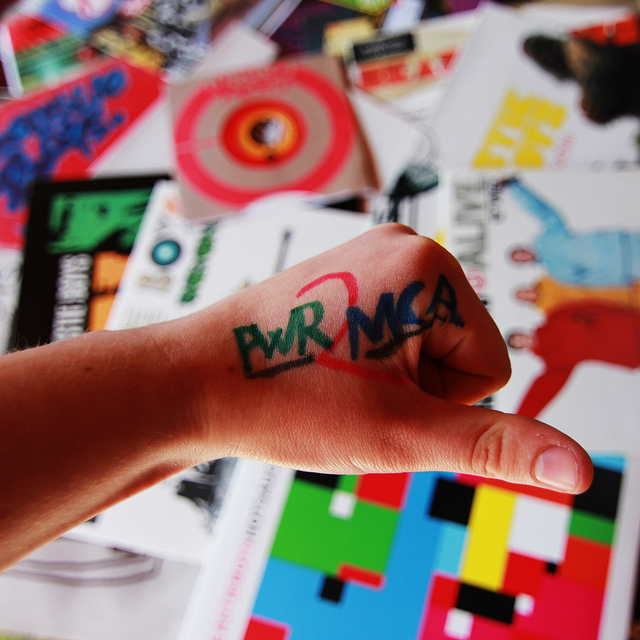By popular reader demand, CDM remembers Adam Yauch this week, teaming up with our friends at Network Awesome, who dig deep into the archives for some video gems. Peace, Adam, indeed.
Try http://networkawesome.com/2012-5-11 if the video above isn’t loading for you.
It’s not hard to understand the impact of the loss of Adam Yauch, aka MCA, founding Beastie Boy. With the passing of music idols comes a sense of the passage of time, all the more so when they’re barely into middle age. But MCA, to a swath of music fans, is more than a distant idol. He, and the band he helped build, somehow make a connection as everymen to those who loved their music. It’s not because they’re white kids from Brooklyn rapping, or because Yauch had a Jewish mother; that’d ignore their popularity across the broader hip-hop spectrum and far from the New York City boroughs. It’s not simply their combination of punk and hip-hop and rock, though that blend they and producer Rick Rubin brewed was clearly an essential vehicle.
Somehow, Yauch spans coming of age all the way from unapologetic immaturity to genuine manhood. Maybe it’s beause Yauch was so downright irreverant, ready to speak up, in that uniquely forward manner of New Yorkers, across that whole span. And Yauch’s own journey has unique appeal, seeming to play every possible role a musician can. From starting a band with an inflatable phallus and crank calls to ice cream shops made into raps to contemplative Buddhist advocate and activist, everyone seems to just follow along. “You’ve got to fight for your right to party,” and the fans nod in agreement. “The disrespect to women has got to be through,” and the fans nod in agreement. From raucous kid to advocate of women’s rights, against violence, for Tibetan freedom, in a New York facing down 9/11 and an America choosing between peace and war, Yauch earnestly gave voice to those people. Celebrities can try to do this, but Yauch and the Beasties could do it for fans who truly felt they were one of their own.
To understand that appeal, though, you have to go back to the most irreverant stuff, the jokes the Beasties would later apologize for. You have to see them in their rawest state, mugging for New York’s DIY public access television, making weird informercials for their music. You have to see them live, tearing it up, making the music that kept them from being just another label creation or young kids’ fantasy. People loved Adam Yauch the man because they understood the kid, because they grew up with him. And what an extraordinary path he took – what an incredible, unforgettable voice.
That’s why I’m hugely grateful to Jason Forrest of Network Awesome for teaming up with us to share some of those videos, some of the oddest and most obscure finds, dug from the archives and found via YouTube, “sampled” from the Interwebs in the way the Beasties sampled on their records. In the lineup:
- Interviews with the Beastie Boys at every stage of their career.
- The Beasties in 1994 presenting MTV’s excellent, sadly-defunct 120 Minutes.
- An extraordinary live performance in Germany on the Hello Nasty tour.
- In LA, the charming Paul’s Boutique record release party, which shows off a lot of the character of the trio.
- An early view of the band on NYC public access cable – The Scott and Gary Show.
- Faux infomercial, made obviously on the cheap, for Hello Nasty. Did MCA invent hipster fashion? You be the judge.
Live Music Show: Beastie Boys, Curated by The Sadnesses
http://networkawesome.com/2012-5-11 – All the videos on one Network Awesome page
Assuming you can tear yourself away from watching the videos, we have text, too. Among the many words spilled over the past week by fans, here are a few of my favorites.
Sasha Frere-Jones, who met Yauch first in 1982 at age 15, gets straight to this personal connection in his obituary for The New Yorker:
Adam Yauch was a part of my childhood, an ambassador to America from our New York, which is now gone, as is he.
Understanding both the pre-Rubin Beasties and the improbable, million-selling phenomenon that was to come, Frere-Jones explains:
“Licensed to Ill” presented us with a can of question marks. When did they gain access to handguns? When did they start smoking angel dust? When did they start hitting girls? WHAT. (And you could just sample a Led Zeppelin record? That was O.K.?) When “Licensed to Ill” hit the world, at the end of 1986, it was like an April Fools’ joke that lasted a year. America apparently wanted to hear backward TR-808 drums and samples of Trouble Funk records. Or maybe they liked white kids rapping over loud guitars about partying. O.K.—hold on. Maybe it wasn’t a mystery. “Cooky Puss” was a joke for New York. “Licensed To Ill” was a joke for America. Or on America. It was hard to tell.
A must-read, as I think the most personal of the remembrances, while still – despite his apologies – maintaining enough journalistic distance to provide insight in a way those who knew Yauch must surely appreciate:
PEACE, ADAM [The New Yorker]
CDM reader “nonnon” Dave Madden is not an obituary you’re likely to read elsewhere, but on his personal blog I think he gets right at the heart of that connection to fans, and that feeling of being “fourteen forever.” He paints a picture of 1989:
We weren’t kids, but eighteen only makes a man in theory, especially if you’re still living with your parent(s). The point is, though License to Ill would not be understood, or appreciated, or met with anything but disgust at home or by girlfriends at the time, it was the soundtrack of that first fulltime job and year between half-grownups “taking some time off from school” and someone nudging us with “you need to sort your life out, mate”. It was otherworldly, both the music and the idea that people could stay fourteen years old forever.
I’ll Steal Your Honey Like I Stole Your Bike: MCA RIP and the Influence of Beastie Boys On My 1989
I write about gory technical details because I always find some sense of what makes musicians tick. So, accordingly, we can look back to Electronic Musician for one view of how MCA and the Beasties worked together. For a band that came out of neighborhood friends, it’s little wonder that even in their late albums, they got there by getting together in a room and recording together, all at once. MCA tells EM:
“There is something about the energy of the three of us in the room at the same time,” MCA says. “The main take for any given song will always come from that setting. You could go individually and really scrutinize and do a million punches, but, somehow, the master take always comes from the three of us together. We don’t do as many fixes as compared to how most records are made.”
Future Flashback (2004)
The New York Times takes a New York-centric view of Yauch – whose last name is pronounced, conveniently, in the way the city’s denizens once pronounced York. (Say it: “Yowk.”) Writing for that paper, Jon Pareles codifies the many dimensions of what MCA was to the Beastie Boys, and the Beastie Boys to music:
Mr. Yauch was a major factor in the Beastie Boys’ evolution from their early incarnation, as testosterone-driven pranksters, to their later years as sonic experimenters, as socially conscious rappers — championing the cause of freedom in Tibet — and as keepers of old-school hip-hop memories. The Beastie Boys became an institution — one that could have arisen only amid the artistic, social and accidental connections of New York City.
In the history of hip-hop, the Beastie Boys were both improbable and perhaps inevitable: appreciators, popularizers and extrapolators of a culture they weren’t born into.
Rapper Conquered Music World in ’80s With Beastie Boys [New York Times obituary]
But maybe the most hopeful vision comes from some of these videos, from the youngest iteration of Adam Yauch on cable TV in his home of New York. That homebrewed, DIY, straight-from-the-neighborhood spirit endured in their albums and videos through multiple decades, multiple generations. And it’s appropriate to remember Yauch as a filmmaker through that medium. It seems we still haven’t seen the act to come out of the YouTube generation, the way the Beasties ascended from public access to MTV. But maybe, somewhere, that neighborhood band is there, whether in Brooklyn or a suburb of Delhi. Maybe they’re fourteen. Through the miracle of recording and the album, we can remember Yauch as the man he became, but also as MCA, fourteen forever, and that spirit that drives musicians – endless, irreverant possibility.

